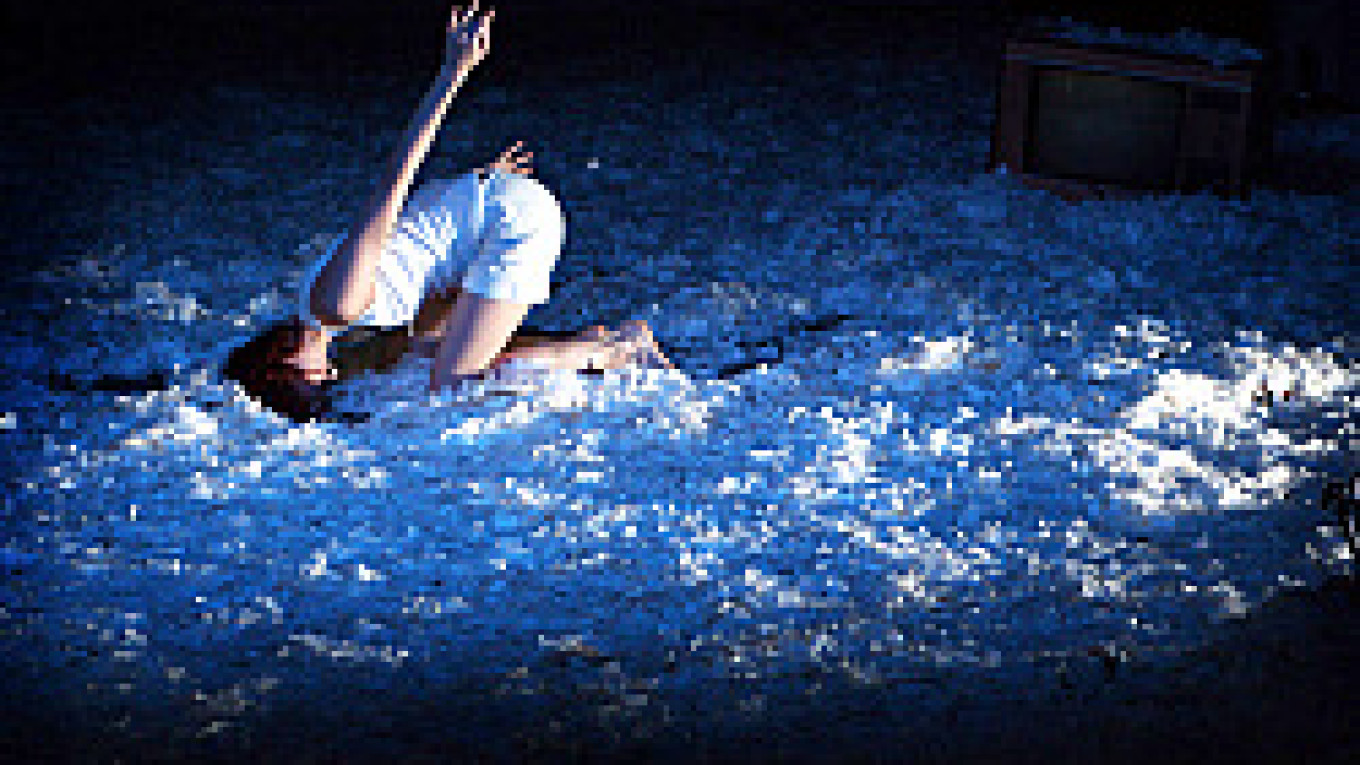On the other hand, you have to be understanding. It's not like the topic of young people facing the dangers of a hostile world is going to go away soon.
"Pulya" by Natalya Moshina at the Playwright and Director Center is the latest of these works to appear in Moscow. Moshina is a writer from Belarus who has had international success with plays such as "Techniques of Breathing in an Airlocked Space," produced by the Sputnik Theatre in London. "Pulya," the title of which refers to a young woman's name but is also the word for "bullet" in Russian, is formally simple, a piece consisting of dialogues for an actor and an actress. But there is also a delicate arc to the journey on which Pulya embarks that sets this play apart.
Director Viktoria Zvyagina and designer Anna Perezhogina did a fine job tapping into the work's delicacy. They covered the entire stage in tiny scraps of paper, which probably indicate a snowfall but also suggest the frailty and gentleness of a world inundated in feathers. Props of various kinds are hidden beneath the paper snow, and actors pull them out as if by magic at those moments when they are necessary. Playing with deeply colored lighting of blue and green, Zvyagina gives an unearthly feel to the goings-on of the play.
Indeed, most of what we are seeing is probably taking place in another realm.
Pulya (Anastasia Marchuk) is reliving her life in her mind. Why she is doing this is best left unclear in a review, but this is her journey: recollections from the womb on through her early adulthood, when she meets a man who may be of dubious character but who introduces her to the heights of passion and sexuality.
There is a man (Yevgeny Antropov) alongside Pulya at almost all times. He may be her father, her first lover or the fateful man she eventually falls in love with. In all cases, they are her foils. They are a background, of sorts, against which her life unfolds.
Pulya's life is not an easy one. There are indications of heavy drinking, suicidal tendencies and violence done to her ?€” both physical and mental. She is a lonely girl growing up and in her early adult years. She doesn't fit into the world. Her first awareness of herself occurs in early childhood when a boy calls her "ugly, with crooked teeth." It is a devastating revelation for her ?€” she had always considered herself utterly charmed and charming.
Another shock occurs when her father makes a confession about his marriage. Pulya's mother, it seems, once admitted that she would have been better off had she married another man. The blow that Pulya's father suffered years ago is transferred in whole to Pulya as a young woman. The injustice of the moment is stinging and nearly unbearable. How can that be? Pulya's father was a wonderful, slightly scatterbrained scientist. How could he not be the uncontested center of Pulya's mother's world?
Injustice, it seems, is everywhere, and it strikes down everyone ?€” even the kindest, most loving people.
Marchuk is superb as the introspective and sensitive Pulya. She has an inquisitiveness, a strength and a vulnerability that make her character irresistible. Her most touching moments are spent with her father, although it's not until she crosses paths with a nameless, pistol-packing man that she suddenly blossoms as an adult. It is no easy task for an actress to travel the distance between a fetus and a female of sexual maturity in less than 90 minutes. Marchuk does it with ease and assurance.
"Pulya" does not escape the cliches of its genre entirely. There are occasional moments, especially early on, when Moshina seems to use her characters to contemplate her navel. But she has transcended those limitations by the time the play reaches its conclusion. Its final twists and turns carry it into new and challenging territory.
Under Zvyagina's painstaking direction and buoyed by Marchuk's fine performance, this is an often beautiful and sensitive production about a common young woman's life lived on the edge.
"Pulya" plays June 18 and 19 at 8 p.m. at the Playwright and Director Center, located at 5 Begovaya Ulitsa. Metro Begovaya. Tel. 945-3245. Running time: 1 hour, 25 minutes.
A Message from The Moscow Times:
Dear readers,
We are facing unprecedented challenges. Russia's Prosecutor General's Office has designated The Moscow Times as an "undesirable" organization, criminalizing our work and putting our staff at risk of prosecution. This follows our earlier unjust labeling as a "foreign agent."
These actions are direct attempts to silence independent journalism in Russia. The authorities claim our work "discredits the decisions of the Russian leadership." We see things differently: we strive to provide accurate, unbiased reporting on Russia.
We, the journalists of The Moscow Times, refuse to be silenced. But to continue our work, we need your help.
Your support, no matter how small, makes a world of difference. If you can, please support us monthly starting from just $2. It's quick to set up, and every contribution makes a significant impact.
By supporting The Moscow Times, you're defending open, independent journalism in the face of repression. Thank you for standing with us.
Remind me later.


